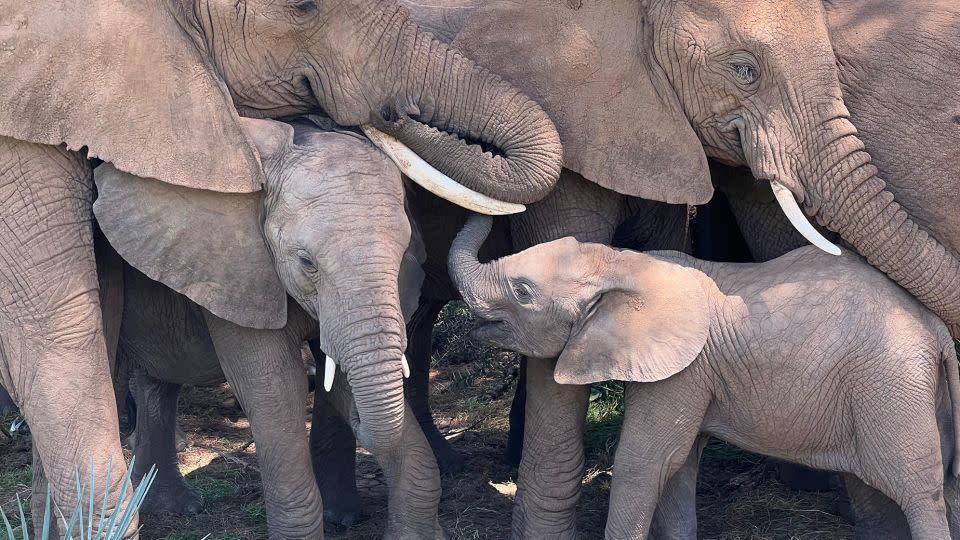wild african elephants may address each other using individualized calls that resemble the personal names used by humans, a new study suggests.
Although dolphins are known to call each other by imitating the signature whistle of the dolphin they want to approach, and parrots have been found to address each other in a similar way, African elephants in Kenya may take a step forward in identifying each other.
These elephants learn, recognize and use individualized, name-like calls to address others of their species, apparently without using imitation, according to the study published Monday in the journal Elephants. Ecology and Evolution of Nature.
The most common type of elephant call is the rumble, of which there are three subcategories. So-called contact noises are used to call another elephant that is far away or out of sight. Greeting rumbles are used when another elephant is nearby. Caregiver noises are used by an adolescent or adult female in relation to the calf she is caring for, according to the study.
The researchers analyzed these three types of booms, using a machine learning model to analyze recordings of 469 calls made by wild groups of females and cubs in Amboseli National Park and Samburu and Buffalo Springs National Reserves between 1986 and 2022. All Elephants were able to be identified individually by the shape of their ears, as they were monitored continuously for decades, according to the study.
The idea was that “if calls contained something like a name, then you should be able to figure out who the call was directed to just by the acoustic characteristics of the call itself,” said study lead author Mickey Pardo, an expert in animal behavior and postdoctoral studies at Cornell University in New York.
The researchers found that the acoustic structure of the calls varied depending on who the target of the call was.
The machine learning model correctly identified the recipient of 27.5% of the calls it analyzed, “which may not sound like much, but it was significantly more than the model would have been able to do if we had just fed it random data.” Pardo told CNN.
“This suggests that there is something about the calls that allows the model to identify who the intended recipient of the call was,” he added.

Call and response
The researchers also found that the elephants were probably not just imitating the voice of the person they were addressing. By comparing pairs of calls between callers and recipients, as well as calls from recipients to other individuals, they found that most calls made by the caller sounded no more like the recipient’s call than when they were directed to other individuals, according to the study.
The researchers then played calls to 17 elephants to see if they recognized and responded to the calls originally directed at them.
They found that elephants would respond more strongly to a call originally directed at them than to a call from the same caller originally directed at someone else. “This meant that elephants knew whether a call was for them just by hearing that call,” Pardo said.
He added that the study “tells us something about the cognitive abilities of elephants, because if elephants address each other this way, they are basically making up names for each other. This implies some capacity for abstract thought – they have to be able to learn this arbitrary sound and associate it with other individuals and, essentially, call each other by name.”
Coen Elemans, a professor of bioacoustics at the University of Southern Denmark who was not involved in the study, called the findings “very exciting, the use of names was unknown among animals.”
“In some animals, such as parrots and dolphins, individuals may have a specific call that others try to imitate, but this is not equivalent to a human name,” said Elemans.
The evolution of language
Elephants maintain varied social bonds throughout their lives with many individuals and are often separated from their closely bonded social partners, according to the study.
Thus, some calls can be used to get the attention of an individual who is far away, while short-distance calls can be used to strengthen social bonds, similar to when humans respond more positively and cooperatively when someone remembers their name, investigators said. .


When elephants were nearby, grooming noises were more likely to be classified correctly by the machine learning model than greeting noises. The researchers suggested that caregivers may use names more frequently with their calves to comfort them or to help them learn their name.
Adult female calls were also classified more correctly than juvenile calls, suggesting that adult females may use more names in their calls because the behavior takes years to develop, according to the study.
Pardo said most mammals aren’t actually capable of learning to make new sounds — a skill needed to label something with a name.
He added that because humans, dolphins and elephants address individuals of their species with something akin to a name, “the need to name other individuals may have had something to do with the evolution of language.”
“Maybe this pressure of having all these complex social relationships – and you need to be able to approach others as individuals – is what led animals, potentially including our own ancestors, to develop this ability to associate new sounds with new things. . This may be what led to language,” continued Pardo.
“It would be super interesting to investigate whether these names are learned. Only very few groups of animals are capable of imitating sounds, which we call vocal learning,” Elemans said in an email. “We knew that some individual elephants could also imitate sounds. Now, this study may point out why vocal learning may also be important; swearing in the wonderfully complex social biology of elephants.”
The study authors were unable to conclusively determine whether different elephants used the same name to refer to the same individual, or whether they addressed the same individual with different names.
They also were unable to determine which aspects of the calls were the name, and the calls also contained information such as the caller’s identity, age, gender and emotional state encoded in their characteristics, according to the study.
Pardo said he would really like to figure out “how these calls actually contain a name, and I would be able to isolate the names of specific individuals, and then I think that would open up a lot of other areas of investigation.”
For more news and newsletters from CNN, create an account at CNN.com



































